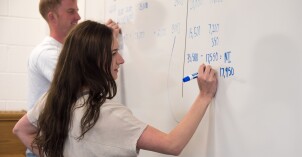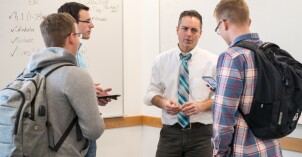
Find Your Value
Students will learn how to reason logically, apply mathematics and statistics to problems with real-world applications, and communicate ideas within their field. They will focus on furthering their knowledge of mathematical theories, processes, and equations in addition to learning the basics of statistics.
The emphasis in mathematics is designed to give students the mathematical foundation they need to better prepare for a quantitative-based career or to prepare them for graduate school. They will further their knowledge by exploring different number theories, stochastic processes, actuarial science, numerical analysis, probability and statistics, and abstract algebra.
The emphasis in mathematics is designed to give students the mathematical foundation they need to better prepare for a quantitative-based career or to prepare them for graduate school. They will further their knowledge by exploring different number theories, stochastic processes, actuarial science, numerical analysis, probability and statistics, and abstract algebra.
"BYU-Idaho showed me a better way of learning. There was much more interaction among teachers and students and thus you created a bond with your classmates and learned how to help each other learn by using each of your strengths. I work very well with others no matter what their background or discipline in my work, and I think that is not only a product of my personality but how we learned and moved forward at BYU-Idaho."
JEFF N.,
BYU-I GRADUATE
Highlighted Career Paths
Mathematics is the common language among all scientific fields, and our graduates have been able to tailor their educational training to find employment in a variety of fields. Check out some of the top careers students get with this degree or explore more career options in I-Plan.
Mathematician
A mathematician has the opportunity to work with advanced mathematical theories and techniques, including mathematical modeling and computational methods, to expand knowledge and its use in solving both theoretical and practical problems.
Mathematics Professor
A mathematics professor uses different teaching models to design and deliver lectures and lessons to a variety of students and their different learning styles. They work to teach their students the mathematics and statistics in conjunction with mathematical research and publication.
Investment/Data Analyst
A data analyst applies their logic and analytical skills to researching, understanding, and communicating problems, information, and potential solutions. They translate the data businesses collect and use it to help the company make better business decisions.
Getting Started in this degree
If you are interested in Mathematics, start with one of the following major-specific courses




